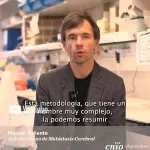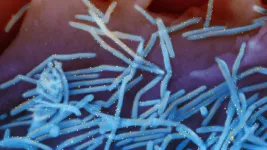(Press-News.org) MONTREAL, Quebec, Canada, 31 December 2024 - In a comprehensive Genomic Press Interview, renowned neuroscientist Dr. Michael Meaney reveals pivotal discoveries about the intricate relationship between genes and environment in shaping brain health. As a James McGill Professor Emeritus and former Director of the Translational Neuroscience program at ASTAR Singapore, Dr. Meaney's research has fundamentally altered our understanding of how early-life experiences influence genetic expression and brain development.
"I have always been genuinely fascinated by the search for the developmental origins of individual differences in brain development and function," says Dr. Meaney, whose work has earned him election to the American Academy of Arts and Sciences and the Order of Canada. "More broadly, and inspired by Hebb, I bore a profound dissatisfaction with the conceptually flawed distinction between the influences of 'nature' and 'nurture'."
Dr. Meaney's research journey began with a simple question: what makes individuals different from one another? This curiosity led him to groundbreaking discoveries in epigenetics - the study of how environmental factors can influence gene expression without changing DNA sequences. His work at McGill University and later in Singapore with the GUSTO birth cohort study has provided crucial insights into how early-life experiences become biologically embedded, affecting long-term health outcomes.
"We too readily embrace narratives and technology that appeal to the general public, achieve headlines, and attract venture capital, but are far too simplistic to capture the complex reality of brain health truly," Dr. Meaney observes, highlighting the need for nuanced understanding in neuroscience research.
The significance of Dr. Meaney's work extends beyond the laboratory. His research has critical implications for public health policy, suggesting that early intervention programs could have lasting effects on brain development and mental health. The findings raise intriguing questions about how society might better support child development: How can we translate these scientific insights into practical interventions? What role do different types of early experiences play in shaping resilience?
With over 650 publications to his name, Dr. Meaney's work continues to influence how we think about human development. His current focus on applying novel computational approaches to 'big data' opens new avenues for understanding gene-environment interactions. "The large data sets of the day are an ideal playground for one seeking to document gene x environment interactions on health and well-being," he explains.
Dr. Michael Meaney Genomic Press interview is part of a larger series that highlights the people behind today’s most influential scientific ideas. Each interview in the series offers a blend of cutting-edge research and personal reflections, providing readers with a comprehensive view of the scientists shaping the future. By combining a focus on professional achievements with personal insights, this interview style invites a richer narrative that both engages and educates readers. This format provides an ideal starting point for profiles that delve into the scientist’s impact on the field, while also touching on broader human themes. More information on the research leaders and research rising stars featured by Genomic Press can be found in our publication website: https://genomicpress.kglmeridian.com/.
The full Genomic Press Interview, titled “Michael Meaney: What is the biology that underlies the gene x environment interdependence that shapes brain health?” is available on 31 December 2024 in Genomic Psychiatry, offering readers an unparalleled opportunity to explore the thoughts and experiences of one of the most influential minds in neuroscience and neurobiology of brain disorders. The article is freely available online at https://doi.org/10.61373/gp024k.0100.
About Genomic Psychiatry – Genomic Psychiatry: Advancing Science from Genes to Society (ISSN: 2997-2388) represents a paradigm shift in genetics journals by interweaving advances in genomics and genetics with progress in all other areas of contemporary psychiatry. Genomic Psychiatry publishes peer-reviewed medical research articles of the highest quality from any area within the continuum that goes from genes and molecules to neuroscience, clinical psychiatry, and public health.
END
McGill scientist reveals how early life experiences reshape our genes and brain health
Distinguished researcher Dr. Michael Meaney discusses gene-environment interactions in exclusive Genomic Press Interview
2024-12-31
ELSE PRESS RELEASES FROM THIS DATE:
Renowned scientist reveals vital link between inflammation and depression through groundbreaking research
2024-12-31
JERUSALEM, Israel, 31 December 2024 - In a comprehensive Genomic Press Interview, distinguished neuroscientist Professor Raz Yirmiya unveils transformative insights into the relationship between inflammation and depression. As head of the Laboratory for Psychoneuroimmunology at the Hebrew University of Jerusalem, Professor Yirmiya's work has fundamentally changed our understanding of depression's biological underpinnings.
"Most depressed patients do not have any overt inflammatory disease. However, we and others found that exposure to stress, which is the most significant trigger of depression in humans and animals, also ...
Medical researcher explores economic impact of psychedelic therapy implementation
2024-12-31
ATLANTA, Georgia, USA, 31 December 2024 - In a comprehensive Genomic Press Interview, Emory University MD candidate Fayzan Rab shares insights into his pioneering research on the economic and public health implications of psychedelic therapy implementation. Rab's work at the Emory Center for Psychedelics and Spirituality bridges the gap between clinical research and real-world healthcare delivery systems.
"It would be a fool's errand to say that psychedelic therapies alone would change that," says Rab, discussing mental healthcare challenges. "Treating mental illness will require changes within clinical practice but also investments into social safety ...
Improving immunotherapies for kidney cancer
2024-12-30
A Medical University of South Carolina Hollings Cancer Center researcher is exploring new ways to improve treatment options for kidney cancer patients. With funding from a Department of Defense (DOD) Academy of Kidney Cancer Investigators Early Career Scholar Award, Aguirre de Cubas, Ph.D., will investigate how the immune system can be boosted to detect and kill kidney tumors. Congress established the award in 2017 to support research with high potential impact and exceptional scientific merit. De Cubas’ approach focuses on reactivating the immune system to recognize and target cancer cells better, offering new possibilities for improving existing ...
Billing patients for portal messages could decrease message volume and ease physician workload
2024-12-30
Embargoed for release until 5:00 p.m. ET on Monday 30 December 2024
@Annalsofim
Below please find summaries of new articles that will be published in the next issue of Annals of Internal Medicine. The summaries are not intended to substitute for the full articles as a source of information. This information is under strict embargo and by taking it into possession, media representatives are committing to the terms of the embargo not only on their own behalf, ...
Study of Sherpas highlights key role of kidneys in acclimatization to high altitudes
2024-12-30
(Calgary) — A study from a Mount Royal University physiologist and his team demonstrates the key role of the kidneys in acclimatization to high altitude, and illustrates another way that Sherpas are better adapted to high altitude ascent.
Results from the study were recently published in in the prestigious international science journal Proceedings of the National Academy of Sciences.
The paper, “Comparing integrative ventilatory and renal acid-base acclimatization in lowlanders and Tibetan highlanders during ascent to 4,300 m”, describes findings ...
Smartphone app can help reduce opioid use and keep patients in treatment, UT Health San Antonio study shows
2024-12-30
SAN ANTONIO, Dec. 30, 2024 – Patients with opioid use disorder can reduce their days of opioid use and stay in treatment longer when using a smartphone app as supportive therapy in combination with medication, a new study by The University of Texas Health Science Center at San Antonio (UT Health San Antonio) shows.
The cohort study of 600 underserved patients found that those who chose to use the app – which combines contingency management behavioral therapy and recovery support from peers – and alongside medication, reduced their days of opioid use by 35% compared with ...
Improved health care value cannot be achieved by hospital mergers and acquisitions alone
2024-12-30
Key Takeaways
A new study finds little evidence that hospital mergers and acquisitions reduce costs or improve quality of care.
More strategic quality improvement efforts are needed for patients to benefit from health care integration.
CHICAGO (December 30, 2024) — Mergers and acquisitions of U.S. hospitals and health systems rarely improve the quality of care delivered or result in lower health care costs and prices, according to a study published in the Journal of the American College of Surgeons (JACS).
The study, a systematic review of hundreds of published ...
People who are immunocompromised may not produce enough protective antibodies against RSV after vaccination
2024-12-30
FOR IMMEDIATE RELEASE
Johns Hopkins Medicine researchers have shown that people 60 years or older with weakened immunity — primarily organ transplant recipients who take immunosuppressive medications to reduce the risk of rejection and others with immune system disorders — do not respond as strongly to vaccines against the respiratory syncytial virus (RSV) as people in the same age group with normal immune function.
The study, conducted by a research team at the Johns Hopkins Transplant Research Center, was published today in the Journal of the American ...
Does coffee prevent head and neck cancer?
2024-12-30
In a new analysis of data from more than a dozen studies, coffee and tea consumption was linked with lower risks of developing head and neck cancers, including cancers of the mouth and throat.
Cancers of the head and neck are the seventh most common forms of cancer worldwide, and rates are rising in low- and middle-income countries. Many studies have assessed whether drinking coffee or tea is associated with head and neck cancer, with inconsistent results.
To provide additional insight, investigators led by the University of Utah’s Huntsman Cancer Institute examined data from ...
AI replaces humans in identifying causes of fuel cell malfunctions
2024-12-30
Dr. Chi-Young Jung's research team from the Hydrogen Research & Demonstration Center at the Korea Institute of Energy Research (KIER) has successfully developed a method to analyze the microstructure of carbon fiber paper, a key material in hydrogen fuel cells, at a speed 100 times faster than existing methods. This was achieved by utilizing digital twin technology and artificial intelligence (AI) learning.
Carbon fiber paper is a key material in hydrogen fuel cell stacks, playing a crucial role in facilitating water discharge ...
LAST 30 PRESS RELEASES:
A genetic brake that forms our muscles
CHEST announces first class of certified critical care advanced practice providers awarded CCAPP Designation
Jeonbuk National University researchers develop an innovative prussian-blue based electrode for effective and efficient cesium removal
Self-organization of cell-sized chiral rotating actin rings driven by a chiral myosin
Report: US history polarizes generations, but has potential to unite
Tiny bubbles, big breakthrough: Cracking cancer’s “fortress”
A biological material that becomes stronger when wet could replace plastics
Glacial feast: Seals caught closer to glaciers had fuller stomachs
Get the picture? High-tech, low-cost lens focuses on global consumer markets
Antimicrobial resistance in foodborne bacteria remains a public health concern in Europe
Safer batteries for storing energy at massive scale
How can you rescue a “kidnapped” robot? A new AI system helps the robot regain its sense of location in dynamic, ever-changing environments
Brainwaves of mothers and children synchronize when playing together – even in an acquired language
A holiday to better recovery
Cal Poly’s fifth Climate Solutions Now conference to take place Feb. 23-27
Mask-wearing during COVID-19 linked to reduced air pollution–triggered heart attack risk in Japan
Achieving cross-coupling reactions of fatty amide reduction radicals via iridium-photorelay catalysis and other strategies
Shorter may be sweeter: Study finds 15-second health ads can curb junk food cravings
Family relationships identified in Stone Age graves on Gotland
Effectiveness of exercise to ease osteoarthritis symptoms likely minimal and transient
Cost of copper must rise double to meet basic copper needs
A gel for wounds that won’t heal
Iron, carbon, and the art of toxic cleanup
Organic soil amendments work together to help sandy soils hold water longer, study finds
Hidden carbon in mangrove soils may play a larger role in climate regulation than previously thought
Weight-loss wonder pills prompt scrutiny of key ingredient
Nonprofit leader Diane Dodge to receive 2026 Penn Nursing Renfield Foundation Award for Global Women’s Health
Maternal smoking during pregnancy may be linked to higher blood pressure in children, NIH study finds
New Lund model aims to shorten the path to life-saving cell and gene therapies
Researchers create ultra-stretchable, liquid-repellent materials via laser ablation
[Press-News.org] McGill scientist reveals how early life experiences reshape our genes and brain healthDistinguished researcher Dr. Michael Meaney discusses gene-environment interactions in exclusive Genomic Press Interview






